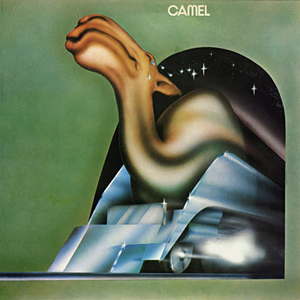As mentioned in the intro, there were far fewer prog bands formed in 1971 than in the previous year. Here is the short list.
Camel (i) 1971 - 1984 (ii) 1991 -
Nationality: English
Original lineup: Andrew Lattimer, Peter Bardens, Andy Ward, Doug Ferguson
First relevant album: Camel, 1973
 Impact:
Impact: 8
The Trollheart Factor: 2
Linked to:
Called “the great unsung heroes of Progressive Rock”, there can be few who follow the scene who have not at least heard of them. A band I always mix up with Caravan, it would take another two years before they would release their debut album, but apart from a breakup or hiatus of ten years at the midsection of the 1980s, they’re still going today. Part of the Canterbury Scene, and indeed one of the premier bands in that movement, Camel are famous for albums such as
The Snow Goose and have to date fourteen albums under their belt, one of the few surviving bands of the seventies prog rock scene.
Druid (1971 – 1977)
Nationality: English
Original lineup: Cedric Sharpley, Neil Brewer, Dane Stevens, Andrew McCrorie-Shand (note: though this last member was not present in 1971, he did join the band before they put out their debut album, so technically I imagine that makes him part of the original lineup)
First relevant album: Towards the Sun, 1975
 Impact:
Impact: 0
The Trollheart Factor: 0
Linked to:
Never heard of these guys before, and they didn’t last long, with only two albums to their name. The only small claim to fame I can find from them is outside of the prog rock world, where founder Cedric Sharpley played in Gary Numan’s Tubeway Army. He passed away in 2012.
Manfred Mann’s Earth Band (i)1971 – 1987 (ii) 1991 -
Nationality: English
Original lineup: Manfred Mann, Mick Rogers, Chris Slade, Colin Pattenden
First relevant album: Manfred Mann’s Earth Band, 1972
 Impact:
Impact: 8
The Trollheart Factor: 4
Linked to:
South African musician Manfred Mann had already had hits under his own name in the sixties before he put together the Earth Band in 1971. With elements of funk, jazz fusion and rock, the Earth Band is perhaps unique in being famous for covering Bruce Springsteen songs for its three major hits: “For You”, “Spirit in the Night” and the hugely successful “Blinded By the Light”.
[U[Matching Mole (1971 – 1973 )[/U]
Nationality: English
Original lineup: Robert Wyatt, Bill McCormick, Phil Miller, Dave Sinclair,
First relevant album: Matching Mole's Little Red Record, 1972
 Impact:
Impact: ?
The Trollheart Factor: 0
Linked to: Sky, Soft Machine, Hatfield and the North, 801, Curved Air
Formed by Robert Wyatt after he left Soft Machine, they were another short-term band who only lasted till really 1972, as Wyatt was paralysed the following year and a third album which had been planned for 1973 had to be cancelled. Robert Fripp was involved in their second and last album, and Sinclair and Miller went on to form Hatfield and the North after Matching Mole broke up.
Time (1971 – 1977)
Nationality: Yugoslavian
Original lineup: Dado Topić, Tihomir "Pop" Asanović, Vedran Božić, Mario Mavrin, Ratko Divjak, Brane Lambert Živković
First relevant album: Time, 1972
 Impact:
Impact: 0
The Trollheart Factor: 0
Linked to:
How weird is it that with prog rock being such an almost exclusively English phenomenon, we come across a band from Yugoslavia in 1971? I know nothing about them, nor do you. Shrug.
Important note: I mentioned in the introductory passage that there were two important bands formed this year, one of which I believed had nothing to do with progressive rock. They were Queen, and even my objections notwithstanding, it seems Wiki has fu
cked it up again, as Queen were formed in 1970. I’ll be damned if I’m going back to add them to the list for that year, and anyway, as I say, what in the name of blue jumping f
uck does Wiki think Queen had to do with prog rock? Sure. “Bohemian Rhapsody” might squeeze in as a prog track, but the rest? No way. Queen are not, never were and never will be progressive rock, so I’m ignoring them entirely.
The other band I mentioned are very much progressive rock, but again Wiki has got it wrong, as its own page on the band mentions that, though they had been together since the 1960s, Styx only took that name in 1972. So they’re not formed this year, despite what its other page says, contradicting it.